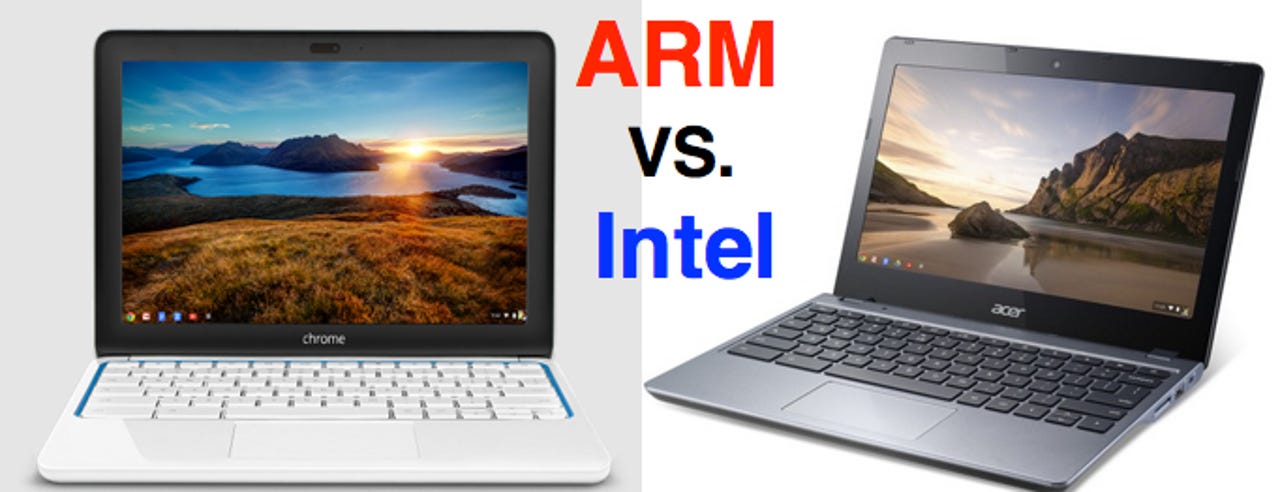Chromebooks: Unlikely battlefield for Intel vs. ARM


Until Windows 8 and RT came along, almost all popular tablets have used ARM technology. ARM processors are in all iPads and Android tablets, even in the Microsoft Surface RT and Surface 2. Tablets run reasonably well and have long battery life due to having ARM inside. ARM technology has always been much cheaper than Intel alternatives, too.
That's a big reason why Intel hasn't been able to make a dent in ARM's lock on the tablet space, largely due to a large price differential. Intel has always stated it wants to go up against ARM but has found that to be hard to do.
That may be changing, but not with tablets as expected. There's an unlikely place that may let Intel compete directly with ARM. That place is in Chromebooks.
The Acer C720 Chromebook with the Haswell Celeron is only $249. That shows how seriously Intel is taking this battle royale with ARM, as it is obviously offering the processor with aggressive pricing.
Laptops running Google's Chrome OS are appearing that will put Intel's latest Celeron processor with Haswell technology directly up against those running ARM. These Chromebooks will allow us to compare Intel's offering directly with ARM technology, both in performance provided and battery life.
HP and Google jointly unveiled the Chromebook 11 recently, a laptop running ARM (Samsung's latest Exynos processor). This Chromebook has 2GB of system memory, the maximum currently allowed by ARM technology not counting Apple's new 64-bit processor in the iPhone 5s.
Acer has just announced the C720 Chromebook that is very similar to the Chromebook 11 with one important exception. Acer is using the Intel Celeron processor with Haswell technology, the first device to use it. This will allow a direct comparison of a good Intel mobile solution with the heavily used ARM. The C720 has 4GB of system RAM which is possible due to the Celeron.
Intel's latest Haswell technology has proven in the field and with benchmarks that it yields both good performance and battery life. These are key attributes for tablets and laptops, and it's expected to do so in this new Chromebook.
AR + VR
A popular Chromebook, the Samsung Series 5 550, has been selling for a while with the last generation Intel Celeron processor, and it's a decent performer. It lacks good battery life, however, an area that the Haswell version of the Celeron should address handily in the Acer C720 Chromebook.
I used a Series 5 550 with its older Celeron for months alongside a Samsung Chromebook with an ARM processor. The Celeron outperformed the ARM Chromebook in every way, but the ARM delivered much better battery life. The $249 price tag on the Samsung Chromebook with ARM made the slower laptop a reasonable compromise over the Celeron device that cost twice as much.
That's what makes these two new Chromebooks interesting to compare. The Chromebook 11 with ARM inside is listing for $279, a decent price. The Acer C720 with the Haswell Celeron is only $249. That shows how seriously Intel is taking this battle royale with ARM, as it is obviously offering the processor with aggressive pricing.
These two Chromebooks should be available in short order, so the comparisons will begin. We'll be able to see how this new Intel Haswell processor stacks up against the ARM technology widely used. And we'll be able to do it at comparable prices, a first.
Some will make the argument that the 2GB of RAM in the ARM Chromebook is a disadvantage when comparing with the Intel Celeron Chromebook with 4GB of RAM. That's a reasonable argument but the comparison of the two referred to in this article is not at a benchmark level. The memory difference is a direct limitation of the processors being compared, and that makes it a good comparison. The prices of the two are comparable, and if the difference in memory is in play that is fair. The important comparison is in usability, not benchmarks.
Intel will no doubt continue to push its Haswell technology on tablets and perhaps even laptops with Windows 8. It desperately wants to show it can handle the mobile needs of both consumers and enterprise customers. But the Chromebook front may be the surprise product category that lets Intel show clearly it is the hardware platform of choice for the price.
See related: